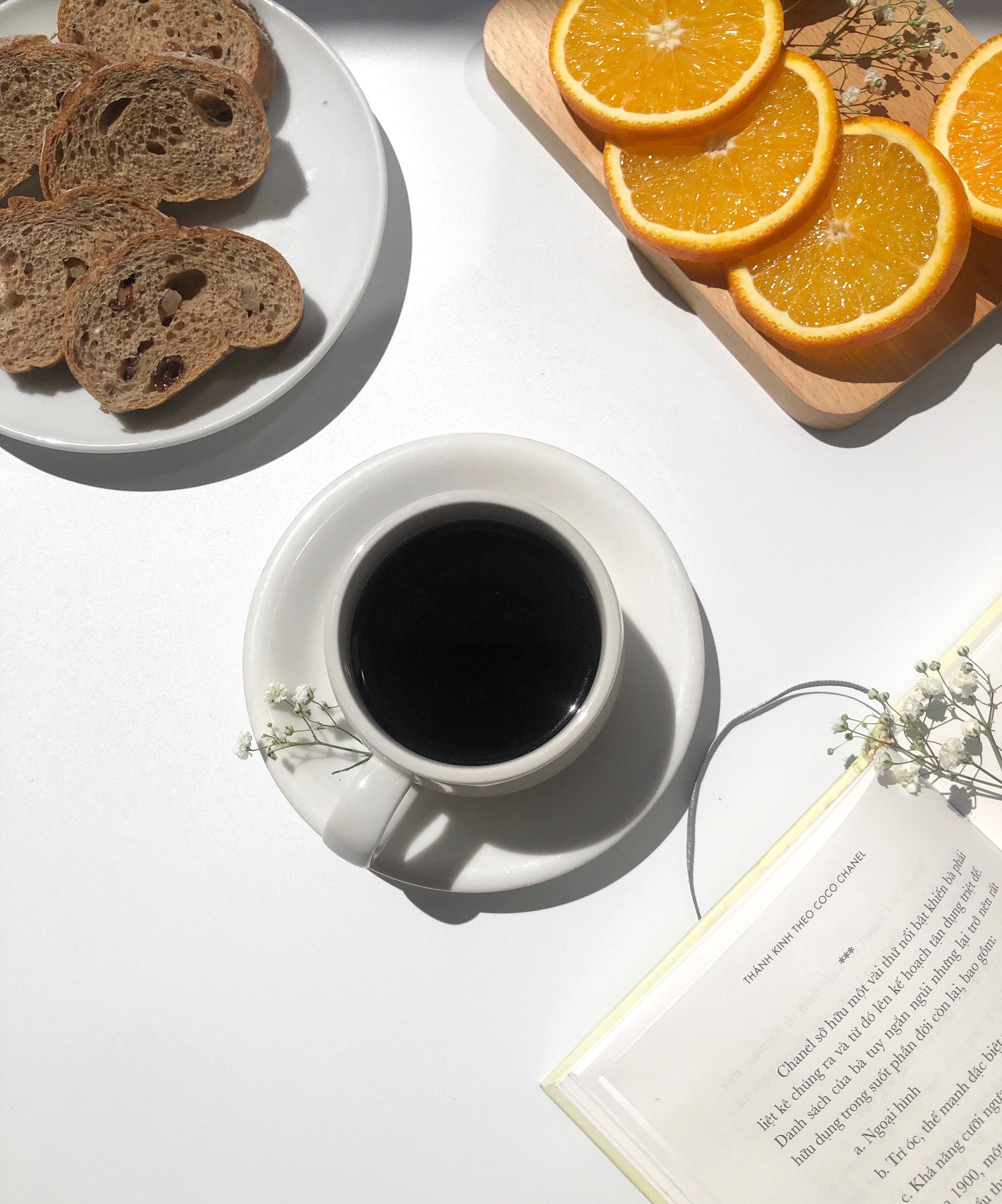When we are stressed out, we look for foods for comfort. To keep us "safe" and warm. Let’s face it, at some point or another, each and every one of us has found comfort in food when something has hurt us, and when done consciously, this isn't a bad thing. Food IS comforting, however, opting for high in saturated fat, sugary and processed food isn’t a good permanent solution and it shouldn't be our go to.
When we turn to fatty, sugary and over processed foods - we can feel better temporarily, but in the long run, worse. When the body isn’t getting the right nutrition, it can begin to feel less energetic, more lethargic, and in some cases less able to concentrate and focus. All of this can lead to even more stress.
So let's explore how stress management and finding comfort in nourishment can change our lives.
Stress Reduction

Returning to centre when in the state of overwhelm can be tricky. So how do we do it?
How to reduce stress:
1. Feel what you're feeling
2. Take deep breaths, longer on the exhale
3. Wake early, between the hours of 5-7am and get some fresh air and oxygen flowing around your body before all else.
4. Switch off an hour before bed and get a good nights sleep (learn how HERE)- instil the same bedtime and wake time each night and morning. Routine is key to help you re-anchor.
5. Declutter - focus on clarity and move towards it
6. Get more physical activity.
7. Follow a healthy nutrition plan - see advice below.
8. Minimise phone use and unnecessary screen time.
9. Consider supplements.
10. Practice self-care. Learn how here
11. Reduce your caffeine intake.
12. Spend time with friends and family + time alone in nature
13. Create boundaries and learn to say no. Express your limits.
What is stress?
What stress is : Stress is the body's reaction to feeling threatened or under pressure. It's very common, can be motivating to help us achieve things in our daily life, and can help us meet the demands of home, work and family life.
But too much stress can affect our mood, our body and our relationships – especially when it feels out of our control. It can make us feel anxious and irritable, and affect our self-esteem (NHS).
Talking about stress should go beyond stress awareness month. Stress physical symptoms and stress work can show up in our daily life often and can be combated by appropriate self care and nourishment.
Take the stress test NHS HERE.
Stress and Anxiety Symptoms
Common anxiety signs and symptoms include:
- Feeling nervous, restless or tense
- Having a sense of impending danger, panic or doom
- Having an increased heart rate
- Breathing rapidly (hyperventilation)
- Sweating
- Trembling
- Feeling weak or tired
- Trouble concentrating or thinking about anything other than the present worry
- Having trouble sleeping
- Experiencing gastrointestinal (GI) problems
- Having difficulty controlling worry
- Having the urge to avoid things that trigger anxiety
Foods that Fight Stress

If you’ve been feeling more stressed out than usual lately, it’s important to know which foods are best to choose and which to avoid when it comes to combating stress and helping you to deal with feelings of stress and anxiety. The best way to fight stress is to have a healthy, balanced diet which includes a moderate amount of each of the different food groups. Stress and nutrition rarely go hand in hand. When we nourish ourselves, mind, body and spirit, we place ourselves in a much better position to manage the stressors of life.
Which foods reduce stress and what foods reduce stress and anxiety?
Filling up on foods such as whole grains, leafy vegetables, and lean proteins as the basic staples of the diet is a great way to ensure that your body gets the optimum amounts of nutrients to fight both physical and mental health challenges. When it comes to choosing foods to eat, many have a range of great properties which help the body to combat stress. Choosing these stress-busting foods can help to heal and calm your mind permanently, rather than providing a temporary fix. Let's explore them below.
Some of the best stress-fighting foods and how nutrition helps mental health include:
- Bananas! Bananas contain tryptophan, a type of protein that the body converts into mood-lifting serotonin.The nutrition in bananas also contain vitamin B6, which has been shown to even out our mood naturally and even relieve symptoms of PMS.
- Nutrition milk - providing the nutrients for babies to grow, a glass of milk provides everything from calcium to vitamin D. Grab a glass when looking for comfort.
- Nutrition in Avocado – Avocados are a nourishing and versatile fruit which can be eaten in a range of different ways. The nutrient dense fruits have the properties to stress-proof your body, thanks to their high glutathione content which specifically blocks the intestinal absorption of certain fats which cause oxidative damage. The nutrition of avocado also contain higher levels of vitamin E, folate, and beta-carotene than any other fruit, which boosts their stress-busting properties. However, be careful with portion control when eating avocado, as it is high in fat - the good kind - to be eaten moderately.
- Nutrition in eggs - Nutrition egg how much nutrition in 1 egg? The nutrition in an egg has only 75 calories but 7 grams of high-quality protein, 5 grams of fat, and 1.6 grams of saturated fat, along with iron, vitamins, minerals, and carotenoids. The egg is a powerhouse of disease-fighting nutrients like lutein and zeaxanthin.
- Blueberries – If you’re feeling stressed out, reaching for one of the best superfoods is a great way to help you deal with your stress levels and achieve a higher level of calm. Nutrition blueberries have some of the highest levels of antioxidants, especially antho-cyanin, linked to a wide range of health benefits including sharper cognition, focus, and a clearer mind, all of which can help us to better deal with stress.
- Chamomile Tea – Chamomile tea has long been used as a natural bedtime soother, and it has also been used in clinical trials, which determined that chamomile tea is effective in reducing the symptoms of generalised anxiety disorder.
- Cocao – there is an undeniable link between chocolate and our mood. Studies have shown that consuming cocoa can make us happier.
- Porridge – Oats are great in that they can be a filling comfort food, but also has a large number of healthy properties to make us feel better from the inside out. As a complex carbohydrate, oats cause our brain to produce higher levels of the feel-good chemical serotonin, helping to feel calmer and less stressed. Studies have shown that children who choose oats for breakfast tend to be much sharper throughout the morning in school compared to children who had alternative morning meals.
- Brazil Nuts – If you’re looking for a healthy snacking option which will help you to stay better in control of your stress levels, high in selenium brazil nuts are a great choice and great for your skin, too!
- Pistachios – another nut which is great for snacking on and can also help to combat stress and anxiety in the long term is pistachios. Studies have found that simply eating two small, snack-size portions of pistachios per day can lower vascular constriction when stressed, putting less pressure on the heart by further dilating your arteries.
- Green Leafy Vegetables – leafy, green vegetables should be a pivotal part of anyone’s diet. Along with helping to combat stress, leafy greens are full of nutrients and antioxidants which help to fight off disease and leave your body feeling healthier and more energised. Dark leafy greens, for example spinach, are especially good for you since they are rich in folate, which helps your body to produce more mood-regulating neurotransmitters such as serotonin, which is a ‘feel-good’ chemical. Making leafy greens a part of your diet will help you to feel happier and less stressed out overall.
- Nutrition rice - The high fibre carbohydrates found in brown rice helps the body release serotonin, the feel-good chemical in your brain which can help to improve your mood quickly. Opt for brown rice over white and remember portion discipline.
- Fermented foods – Eating fermented foods such as yogurt does wonders to keep our gut healthy, which in turn helps to improve your mental health and reduce stress levels. The beneficial bacteria which are found in fermented foods such as yogurt actually have a direct effect on our brain chemistry and transmit positive mood and behaviour regulating signals to the brain via the vagus nerve.
- Nutrition of potatoes - B6, Vitamin C and Magnesium are just some of the nutrients found in potatoes. Potatoes, especially its white flesh, are also rich with tryptophan, which we have learned has natural sedative properties that help calm the nerves and is great for our mood.
- Nutrition of mushrooms - Mushrooms are a source of fibre, vitamin B, vitamin D, potassium, and an array of antioxidants; nutrients that support improved mental health and emotional wellbeing.
- Nutrition of broccoli - The nutrition in broccoli can do wonders for our mood. Broccoli is rich in chromium, which similar to zinc, is essential to the mood regulating areas of the brain.
- What nutrition is in chicken? Nutrition in chicken breast. Looking for a protein boost? Nutrition 100g chicken breast also contains Vitamin B12. and tryptophan.
- Nutrition raspberries - The flavonoids in berries have also been shown to help improve coordination, memory, and mood. Raspberries also contain small amounts of Vitamin A, thiamine, riboflavin, vitamin B6, calcium and zinc. They are a good source of fibre, vitamin C and potassium.
- Nutrition of dates - sweet and soothing dates contain vitamin B6. B6 is one of several B vitamins required for proper production of neurotransmitters.
- Nutrition yellow split peas - Rich in fibre and protein + vitamins B1, B5, K, and folate, iron, magnesium, zinc, split peas are also rich in Vitamin B6.
- Grains and plant based food - fill your plates with colourful and vibrant feel good foods! Lentils, sweet potato, mango, seeds and more!
What fruit is best for stress? Opt for citrus fruits, high in Vitamin C. Berries packed with flavonoids and potassium rich fruits such as pumpkin (seeds) and banana.
Food to Avoid - What Foods Trigger Anxiety
- Nutrition Mcdonald's - Not likely. Avoid fast foods on the regular. Drinks which are high in sugars and caffeine, such as coffee, energy and sweet fizzy drinks, can actually increase your stress levels if consumed regularly.
- If you're experiencing high levels of stress - ditch the alcohol. Drink to celebrate, never to soothe.
- According to the data, if you eat "lots" of processed meat, fried food, refined cereals, candy, pastries, and high-fat dairy products, you're more likely to be anxious and depressed.
Supplements for Stress
Vitamins and minerals play an important role in the body’s stress response and mood regulation. As such, a deficiency in one or more nutrients may affect mental health and ability to cope with stress.
Studies show that certain dietary supplements can help to reduce stress and improve mood.
Magnesium - When you’re chronically stressed, your magnesium levels may become depleted. This mineral plays an important role in your body’s stress response, it’s important to make sure you’re getting enough each day. Supplementing with magnesium has been shown to improve stress in chronically stressed people.
Supplements stress and anxiety - 5HTP - The perfect stress relief supplements. 5 HTP, short for 5-Hydroxytryptophan, is a naturally occurring amino acid and chemical precursor as well as a metabolic intermediate in the biosynthesis of the neurotransmitter Serotonin.
Stress supplements - Vitamin D3 - Study after study indicates the direct link between vitamin D levels and mental health is so strong that adding just 1,000 IU of vitamin D per day can reduce fatigue, feelings of depression and anxiety.
Shop Now
ENERGISE - B Vitamin Complex
360 Multivitamin with magnesium
Putting Together Your Diet Plan
Planning your meals wisely is key to not only staying physically fit and healthy, but also to staying mentally alert and being able to best manage your levels of stress. Knowing which foods to avoid and which are the best to reach for to snack on when you’re feeling worried and anxious is important to helping you get control over your emotions and fears.
When you’re feeling stressed, you may be tempted to reach for classic ‘comfort foods’ – usually foods which are laden with sugar, very starchy, or greasy. However, although these foods can make you feel momentarily better, they will actually make you feel worse in the long run.
Having a list of stress-busting snacks snack to go to, such as fresh berries, dark chocolate, yogurt, nuts and seeds, or even a fruit smoothie with avocado and leafy greens in it can help you to feel better in both the short and long term when it comes to stress. When it comes to combating and dealing with stress in the long run, it’s important to make sure that for the most part, you are eating a diet which is healthy and balanced.
In order to stay on track, it’s a good idea to make a meal plan for your week, or at least, day ahead and plan to make sure that you have a good selection of stress busting foods in your kitchen to make meals and snacks from when you’re feeling like stress eating. Making sure that the majority of your meals include foods such as lean proteins and leafy green vegetables will not only make you feel healthier overall, but can improve your mental health and stress levels, too.
A good example of a healthy, stress busting menu would be:
Breakfast: Porridge with berries or a fruit smoothie with avocado and berries
Supplement: Multivitamin with water
Mid-morning snack: Natural yogurt with fruit or a handful of pistachio nuts and seeds
Supplement: Omega 369 with water
Lunch: A whole-grain pasta salad filled with plenty of leafy greens
Afternoon snack: Dark chocolate
Dinner: Chicken breast, sweet potato with vegetables
Supplement: 5HTP with plenty of water
Before bed: Chamomile tea
Of course, you don’t need to stick to this menu – but we hope that it will help serve as a template to build in your own ideas. Remember to exercise good portion control when eating foods such as nuts, chocolate, yogurt and avocado! Make sure that first and foremost, you’re filling yourself up with foods which provide sound nourishment and are good for your mental health.
In Summary - How Do I Calm My Nerves with Food?
We hope that you enjoyed your foods that fight stress for stress relief guide. When you find yourself asking " how can I reduce stress quickly ?" Think food. What am I consuming, what am I not consuming, what does my body need, what does my brain need, am I drinking the right amounts, where else can I get my comfort from and whenever you are in need, return to the above for your sacred stress and comfort guide back to health and mental wellness.
Katherine Elyse Blake , BSC Nutrition, ANUTR
READ MORE - Best Foods for the Work Week



